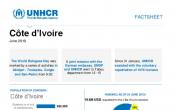Côte d'Ivoire
Operation: Côte d'Ivoire
Location
{"longitude":-6,"latitude":8,"zoom_level":7,"iso_codes":"'CIV'"}
By clicking on the icons on the map, additional information is displayed.
The boundaries and names shown and the designations used on this map do not imply official endorsement or acceptance by the United Nations.
Key Figures
| 2020 planning figures | |
| 3,000 | Ivorian refugees hosted in neighbouring countries will be assisted to return in safety and dignity |
| 1,000 | undocumented Ivorians, including foundlings, will be granted nationality certificates |
| 2018 year-end results | |
| 1,590 | people of concern with specific needs were assisted |
| 920 | returnees were provided with permanent shelter support |
| 370 | people, repatriated in 2017 and 2018, benefited from income generating and housing assistance |
| 320 | refugee children received education support, with 180 enrolled in primary education and 140 in secondary education |
| 130 | people of concern were registered and issued documentation through a late-birth registration procedure |
People of Concern
38%
Increase in
2019
2019
| 2019 | 960,910 |
| 2018 | 696,972 |
| 2017 | 702,415 |

[["Refugees",2021],["Asylum-seekers",169],["Returned refugees",3252],["Stateless",955399],["Others of concern",69]]
Loading ...
Côte d'Ivoire
< Back
2019
{"categories":[2015,2016,2017,2018,2019,2020],"budget":[26.54975356,30.78501955,20.258448214,16.55100147,16.59783299,13.86995898],"expenditure":[9.28496264,14.39998206,10.84026725,9.52515789,9.74287779,null]}
{"categories":[2015,2016,2017,2018,2019,2020],"p1":[15.03323275,10.38524445,7.03383859,3.88470462,7.07813619,3.70820403],"p2":[3.59930438,3.99044151,4.15883048,9.45701234,6.43120541,7.18585955],"p3":[7.91721643,16.40933359,9.065779144,3.20928451,3.08849139,2.9758954],"p4":[null,null,null,null,null,null]}
{"categories":[2015,2016,2017,2018,2019,2020],"p1":[4.70827247,10.07240248,5.02392262,3.84299947,3.84135447,null],"p2":[2.07055165,1.69819924,1.91388337,3.5142156,4.146049,null],"p3":[2.50613852,2.62938034,3.90246126,2.16794282,1.75547432,null],"p4":[null,null,null,null,null,null]}
Loading ...
CHOOSE A YEAR
- 2014
- 2015
- 2016
- 2017
- 2018
- 2019
- 2020
Year-end Overview
or Résumé (FR)
Plan Overview
Working environment
In August 2018, an amnesty ordinance was passed for those accused or convicted of offences relating to the 2010 post-electoral crisis or offences against state security. This amnesty is likely to enhance the return of Ivorian refugees towards the end of 2018 and early 2019.UNHCR’s multi-year strategy to eradicate statelessness developed in 2015 was updated in 2018 and the implementation is to be continued in 2019. A new civil status law is expected to be adopted in 2018, however, given the imminence of the presidential elections in 2020, a revision of the nationality code may not be a government priority at this stage. With regard to the reduction of statelessness, a ministerial circular on the application of Article 3 of the Ivorian Nationality Code is expected to be passed in late 2018, which will authorize the judiciary to grant nationality to children of unknown parentage. In 2019 UNHCR will facilitate the issuance of late birth certificates and carry-out training on civil registration, in light of the new civil status law expected to be passed in 2018. UNHCR is currently engaged in a mapping study of the stateless population and those at risk of statelessness in Côte d’Ivoire. This study began in June 2018 with a pilot and final results are expected in December 2018. The study provides some of the first concrete statistics on statelessness in Côte d’Ivoire and forms a key part of UNHCR’s work on combatting statelessness in the country. The study will allow UNHCR to build profiles of the stateless population, including by levels and types of civil documentation, age, gender, education level, occupation, region, social background, immigration status and a host of other factors.
UNHCR will focus, beyond operational partnerships, on strategic partnerships with various stakeholders, such as development agencies to better implement empowerment programmes for refugees and returnees.
UNHCR and other UN agencies have together with the government developed a strategy for sustainable solutions for UNHCR’s people of concern and the host population. The government will continue, through SAARA (Service d'Aide et Assistance aux Refugies et Apatrides) to conduct refugee status determination and process appeals. In collaboration with partners, such as the Ministry of Family, Women and Children, Ministry of Health, Ministry of Education, various community-based organizations and legal clinics, UNHCR will carry out additional activities to improve the living conditions of the refugee populations. In the refugee return areas, the government plays an important role in facilitating the implementation of sustainable reintegration activities. UNHCR will work closely with the government in order to include persons of concerns’ solutions in the National Plan of Development (PND). In addition, UNHCR will continue to facilitate documentation and advocacy for the integration of children into the national education system.
Key priorities
In 2019, UNHCR will:- continue its activities related to refugee status determination, access to documentation and travel documents with the Government, and implementation of durable solutions including local integration;
- strengthen the capacity of the administrative authorities with regard to refugee protection legislation;
- provide assistance on a case-by-case basis to people with special needs and continue to pursue its activities aimed at combating SGBV and improving the protection of children and their access to education;
- support durable reintegration, in particular in the areas of shelter, livelihoods, micro loans, civil documentation and social cohesion, in coordination with the Government, UN agencies and other partners;
- align its exit strategy with the National Development Plan and the UN Delivering As One strategy in Côte d’Ivoire;
- advocate for Nationality Code reform (through high-level meetings, production and use of campaign materials, workshops) to ensure nationality is granted for stateless children, long-staying migrants and their descendants who have a link with Côte d’Ivoire (e.g. birth, residence);
- provide legal assistance under the statelessness reduction programme that includes access to lawyers, information sessions and counselling;
- put in place a stateless determination procedure to provide a protective status to stateless migrants as an interim solution and last resort;
- continue awareness-raising in local languages among the stateless population, at-risk and nearby communities to ensure access to laws and birth registration, improved public attitudes and to prevent future rights violations;
- establish a coordinated and comprehensive response to mixed movements by helping to ensure respect for fundamental rights and the enjoyment of international protection in the context of mixed movements in Côte d’Ivoire as country of destination, departure and transit.



















